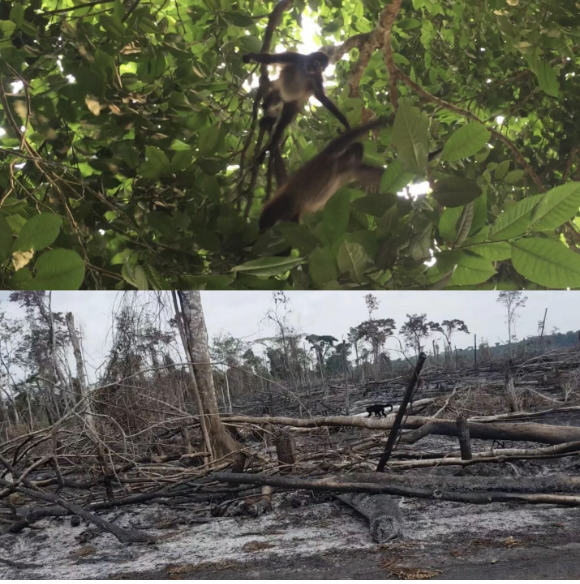Redesigning Payments for Ecosystem Services in Mexico to Increase Cost-Effectiveness

Researchers collaborated with Conafor, Natura Mexicana, and IPA Mexico to compare full versus partial enrollment of forest in payments for ecosystem services (PES) contracts. PES involves paying forest-owning households to conserve their land. Full enrollment reduced deforestation by 39 percent, increasing PES cost-effectiveness by 4.6 times, showing promise for forest conservation and local livelihoods.
Deforestation contributes up to 20 percent of global greenhouse gas emissions, primarily driven by agricultural expansion.1 As the effects of climate change strengthen, it is important to find solutions that can protect forests as carbon sinks while ensuring individuals can maintain their economic livelihoods. One promising program is payments for ecosystem services (PES), which offers forest-owning households cash payments for conserving their forested land. Evidence from Uganda suggests that this can reduce deforestation and forest degradation.2
Mexico’s national forest commission, Conafor, has operated a PES program since 2003, known as PSA. In PSA’s standard contract, households can apply to enroll part of their forested land to conserve in return for payments. The Selva Lacandona region in the state of Chiapas in southern Mexico, where this study was conducted, has the country’s largest high-canopy tropical forest and extensive agricultural expansion. Households enrolled in PSA in this area have reduced deforestation3 and experienced positive economic benefits.4 However, not all forested land is enrolled and deforestation on non-enrolled land for agriculture remains high.5 Furthermore, due to PSA budget cuts,6 discovering ways to improve the program’s cost-effectiveness becomes a significant policy priority.
Researchers partnered with Conafor, Natura Mexicana, and IPA Mexico to conduct a randomized evaluation to measure the impact and cost-effectiveness of a new contract that requires PES participants to fully enroll their forested land to receive payments. This would in theory generate additional forest enrolled that was not enrolled in the standard contract, and specifically the forest that was most likely to be deforested without PES. A total of 63 farmers across 5 ejidos (entities with individually-managed plots and communally-managed resources) were randomly assigned to receive either the new full enrollment contract or the standard partial enrollment contract. Researchers measured impacts on deforestation and compliance with the contracts.
Results showed that the new full enrollment contract had a significant positive impact, with farmers reducing deforestation by 39 percent relative to households in the standard partial enrollment contract. This was driven mainly by farmers conserving forests on parcels that they were not planning to enroll if given a choice. Fewer complied with the full enrollment contract (71 percent compared to 94 percent), but total deforestation was lower due to significantly larger averted deforestation per person. As such, full enrollment farmers received nearly double the total conservation payments as standard enrollment farmers, altogether increasing PES cost-effectiveness by a factor of 4.6.
Sources
1. Grantham Research Institute on Climate Change and the Environment, “What is the role of deforestation in climate change and how can 'Reducing Emissions from Deforestation and Degradation' (REDD+) help?” London School of Economics, February 10, 2023 https://bit.ly/42NyWcm
2. Jayachandran, Seema, Joost De Laat, Eric F. Lambin, Charlotte Y. Stanton, Robin Audy, and Nancy E. Thomas. "Cash for carbon: A randomized trial of payments for ecosystem services to reduce deforestation." Science 357, no. 6348 (2017): 267-273.
3. Charoud, Hugo, Sebastien Costedoat, Santiago Izquierdo-Tort, Lina Moros, Sergio Villamayor-Tomás, Miguel Ángel Castillo-Santiago, Sven Wunder, and Esteve Corbera. "Sustained participation in a Payments for Ecosystem Services program reduces deforestation in a Mexican agricultural frontier." Scientific reports 13, no. 1 (2023): 22314.
4. Izquierdo-Tort, Santiago, Esteve Corbera, Adrian Martin, Julia Carabias Lillo, and Jérôme Dupras. "Contradictory distributive principles and land tenure govern benefit-sharing of payments for ecosystem services (PES) in Chiapas, Mexico." Environmental Research Letters 17, no. 5 (2022): 055009.
5. Izquierdo-Tort, Santiago, Fiorella Ortiz-Rosas, and Paola Angélica Vázquez-Cisneros. "‘Partial’participation in Payments for Environmental Services (PES): Land enrolment and forest loss in the Mexican Lacandona Rainforest." Land Use Policy 87 (2019): 103950.
6. Izquierdo-Tort, Santiago, Esteve Corbera, Alicia Barceinas Cruz, Julia Naime, Paola Angélica Vázquez-Cisneros, Julia Carabias Lillo, Elisa Castro-Tovar et al. "Local responses to design changes in payments for ecosystem services in Chiapas, Mexico." Ecosystem Services 50 (2021): 101305.
Implementing Partners


Funding Partner













